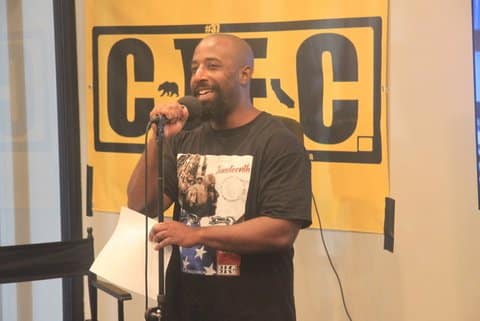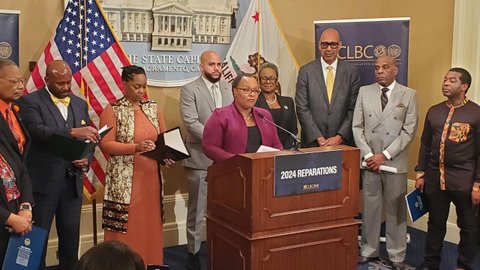
15 Dec Supporting the Reparations Fight: Six Questions for the Coalition for a Just and Equitable California

Chris Lodgson of the Coalition for a Just and Equitable California. (Photo via California Black Media)
By Antonio Ray Harvey | California Black Media
The Coalition for a Just and Equitable California is a statewide organization comprised of various associations, community groups and individuals united by a commitment to fight for reparations and reparative justice for the descendants of enslaved Black American men and women.
In 2020, CJEC worked alongside California Secretary of State Shirley Weber when she was an Assemblymember representing the 79th District in San Diego to author and enact Assembly Bill 3121. That bill, now state law, created America’s first-in-the-nation Task Force to Study and Develop Reparations Proposals for African Americans.
CJEC was one of seven “anchor organizations” sanctioned by the Reparations Task Force and the California Department of Justice to host a series of “listening sessions” designed to ensure certain communities in the state provided their thoughts and concerns about the work the task force was doing. In addition, CJEC helped the task force evaluate California’s role in slavery and Jim Crow discrimination — and followed that work up with developing resolutions to compensate African Americans for past and ongoing race-based injustices.
>>>Read: Attacks on Voting Rights Evoke Jim Crow Era
During one of CJEC’s signature “listening sessions,” the organization introduced Marian and Michael Johnson, sister and brother, members of a Black family that lost property in Russell City due to eminent domain. Russell City was an unincorporated majority Black community located between the Bay Area cities of Oakland and Hayward. Their story garnered national press coverage.
CJEC is also a community co-sponsor of Assembly Constitutional Amendment 8 — the Ending Slavery in California Prisons Act of 2023-204. The California Constitution prohibits slavery and prohibits involuntary servitude, except as punishment for a crime. Authored by Assemblymember Lori Wilson, D-Suisun City, who is also chair of the California Legislative Black Caucus, ACA 8 called for prohibiting slavery in any form, including forced labor compelled by the use or threat of physical or legal coercion in California prisons.
ACA 8 received the two-thirds vote required during the legislative session and a constitutional amendment was placed on the ballot for the November 2024 general election to allow the voters of California to decide its fate.
California Black Media spoke with Chris Lodgson, a CJEC member, about the organization’s advocacy and the work it is doing to support the fight for reparations in California.
CBM: What does your organization do to improve the lives of Black people in California?
CL: CJEC works to improve the lives of Black Californians who descend from persons enslaved in the U.S. by organizing, mobilizing, and advocating for strong lineage-based Reparations.
CBM: What was your greatest success over the course of the last year?
CL: Over the course of last year our greatest successes include:
First, we helped the California Reparations Task Force successfully complete its work developing Reparations recommendations, which were submitted to the Governor, State Senate and State Assembly.
Second, was the passage and signing by the Governor of legislation we wrote that will require California state agencies to collect data on descendants of U.S. Chattel Slavery. Currently our State does not have a way to measure the living conditions of those of us whose Ancestors were enslaved in this country.
Third, organizing and hosting over a dozen Reparations community meetings, town halls, listening sessions, and panel events.
CBM: In your view, what is the biggest challenge Black Californians face?
CL: The biggest challenge Black Californians face is making ends meet to feed and support our families.
CBM: What was your organization’s biggest challenge?
CL: The biggest challenge and opportunity our organization faced over the last year was raising awareness about California’s Reparations efforts.
CBM: Does your organization support or plan to get involved in the push for reparations in California?
CL: Absolutely. We are California’s first, only and leading state-wide grassroots organization born specifically for lineage-based reparations and reparative Justice.
CBM: How can more Californians of all backgrounds get involved in the work you’re doing?
CL: Visit our website at [cjec-official.org] and sign up for volunteer opportunities, our free monthly Reparations news via email and text updates and donate.






Kim Wilson
Posted at 16:11h, 21 DecemberI was born and raised in San Francisco from 1962-1978. I worked for the Chocolate City summer youth program as a teen for Joseph Lee gym and Youngblood Coleman youth center. My grandparents and parents are past residents of the Bayview Hunters Point in which my father was employed at the Shipyard and my mother worked at Model Cities. I have a stack and memories to preserve and would like to know what can I do to help. I now live in the Central Valley but still have family members living in Hunter Point.